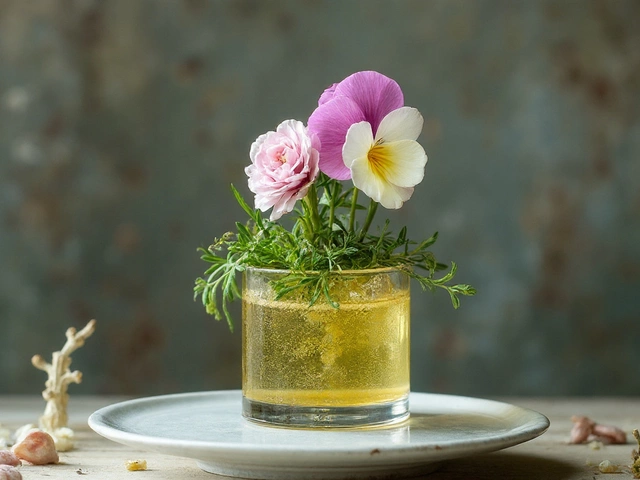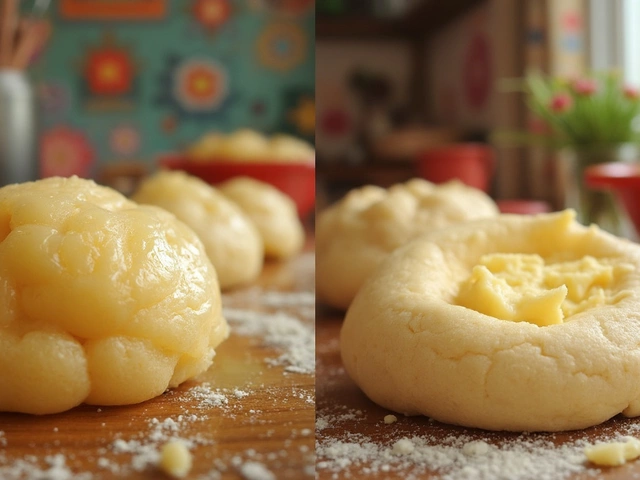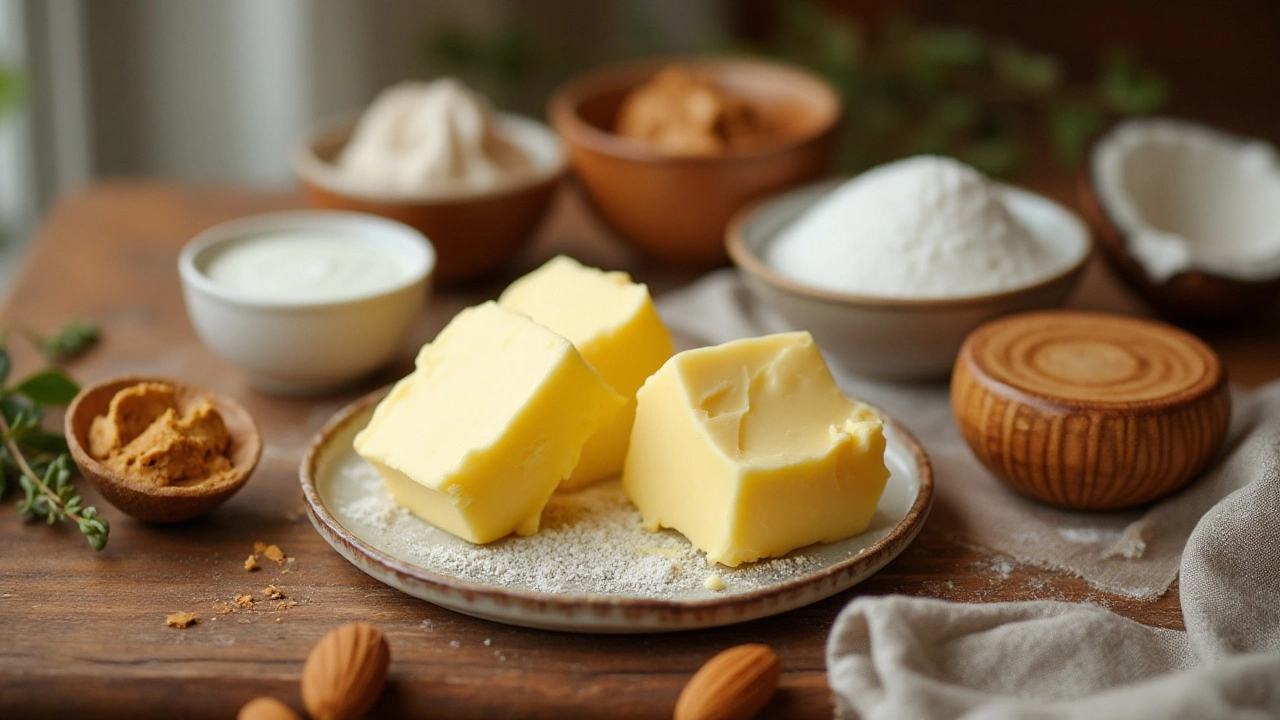
The creamy allure of butter is undeniable, gracing desserts with rich flavor and melt-in-your-mouth texture. Yet, for those embracing a vegan lifestyle, butter poses a unique challenge. While it nestles comfortably in the category of traditional staples, butter finds itself outside the boundaries of vegan diets due to its animal-derived origins.
As plant-based living gains popularity, understanding why certain beloved ingredients like butter aren't vegan helps in the transition to a more conscientious cooking approach. This exploration sheds light not only on why butter is off the vegan table, but also how inventive alternatives can transform your baking endeavors. Dive into this guide to illuminate the way butter’s traditional production diverges from vegan values, and discover tasty, compassionate substitutions that ensure your desserts remain as delightful as ever.
- The Origins and Composition of Butter
- Understanding Veganism and Animal Products
- Why Butter Doesn’t Align with Vegan Principles
- Plant-Based Alternatives to Butter
- Tips for Successful Vegan Baking
- Delicious Vegan Dessert Ideas
The Origins and Composition of Butter
Butter, a beloved ingredient found in countless kitchens, traces its delightful origins back thousands of years. Its journey began when ancient communities discovered the magical transformation of cream into butter, simply by churning it vigorously. This process leads to the separation of the milk fats from the liquid, resulting in the creamy, rich substance that we know today as butter. While different cultures might have refined the methods over time, the fundamental technique has remained largely unchanged.
Traditionally, butter is produced from cow's milk, which is a choice rooted in both availability and flavor preference across different regions. However, variations exist, utilizing milk from goats, sheep, and even buffalo, depending on regional culinary traditions. The composition of this kitchen staple is approximately 80% fat, with the remaining proportion consisting of water and milk proteins. This high-fat content is what gives butter its unique flavor and tender texture, making it an essential ingredient in baking and cooking.
Vegan butter alternatives strive to mimic these characteristics using a variety of plant-based oils and ingredients like coconut or olive oil, often supplemented with emulsifiers and flavoring for an authentic taste. These alternatives allow those embracing a vegan lifestyle to enjoy the indulgent qualities of butter without the dairy, which is derived from animal products. Additionally, the history of butter mirrors societal advancements, with its production evolving alongside human culture and technology.
Even with the advent of modern technology, the core ingredients and buttery taste have remained steadfastly appreciated by cooks and bakers everywhere. The process of churning is a fascinating dance of chemistry and tradition—transforming something as simple as cream into a cornerstone of culinary alchemy. A fascinating tidbit is that during the Middle Ages, butter was regarded as a luxury item, its consumption a privilege reserved for the wealthy.
"Butter is life…It is delicious, a joy, and incredibly pleasing to the senses. Remember that the next time you spread it across your favorite bread." —Thomas Keller
A basic introduction to its origins wouldn't be complete without mentioning its impact on gastronomy and nutrition. Butter brought a flavorful revolution to the culinary arts, opening up a world of possibilities for chefs seeking to add depth to their dishes. But beyond its savory allure, it's essential to reframe how butter fits into a vegan diet—or rather, why it doesn't. By understanding its roots and composition, one can better grasp why alternatives are necessary for a true plant-based lifestyle.
Understanding Veganism and Animal Products
Veganism is more than a dietary choice; it's a lifestyle rooted in the belief of minimizing harm to all living beings. This ideology stems from recognizing the sentience of animals and their rights to live without exploitation. As such, veganism seeks to avoid all products derived from animals, which includes obvious ones like meat and fish, as well as less evident choices such as dairy, eggs, and honey.
At the forefront of this approach is the understanding that animal agriculture not only involves the taking of animals’ lives but also imposes suffering and disrupts their natural behaviors. Dairy farming, for instance, usually involves separating calves from their mothers shortly after birth, a process upsetting both parties. Additionally, there’s the environmental aspect; according to the United Nations, the livestock sector is one of the most significant contributors to environmental degradation, responsible for around 14.5% of global greenhouse gas emissions. Embracing vegan butter and other plant-based products can make a meaningful impact on reducing this footprint.
"Animal production uses about 77% of agricultural land but provides less than 18% of calorie consumption worldwide," notes a report by Our World in Data, highlighting the inefficiency and sustainability concerns tied to animal-derived products.
The decision to exclude animal products extends beyond food. Many vegans also steer clear of clothing made from leather, wool, or silk, and cosmetics tested on animals. This holistic approach ensures that their actions align consistently with the principle of minimizing animal exploitation. With food, vegan desserts offer a vibrant avenue to explore alternatives that are both flavorful and free from animal products. By swapping traditional ingredients like butter for plant-based counterparts, vegans can still indulge in the comfort foods they love, without compromising their ethics.
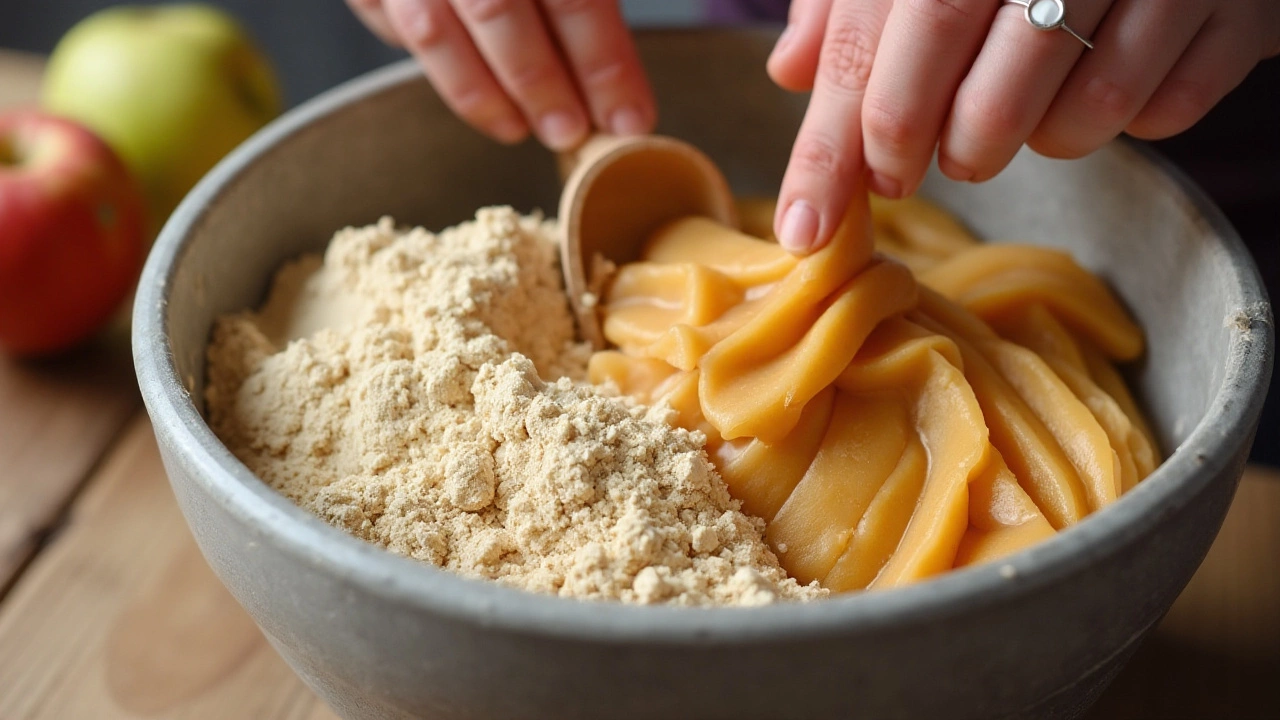
Why Butter Doesn’t Align with Vegan Principles
Butter's storied history makes it a beloved ingredient in kitchens worldwide, but its dependency on animal agriculture firmly plants it outside the realm of vegan-friendly goods. Butter comes from cream, a dairy product that is separated from milk. Cows, primarily used for milk production, experience lives intricately linked to intensive farming practices. This relationship raises ethical and environmental concerns for those who adhere to vegan philosophies. Vegans abstain from animal-derived products, emphasizing compassion for all living creatures—a principle fundamentally at odds with the dairy industry. Dairy production not only involves continual breeding of cows to maintain milk yields but also the eventual removal of calves from their mothers shortly after birth, a practice that resonates poorly with animal rights advocates.
Critics of the dairy industry often point to its significant environmental footprint. Producing a pound of butter requires approximately 21.1 pounds of milk, highlighting the enormous resource consumption involved. The environmental impact extends beyond mere resource use. Cows raised for milk production release considerable greenhouse gases, contributing to climate change. Ethically and environmentally conscious individuals therefore avoid traditional butter, given its link to industrial animal farming. As noted by notable vegan activist and author Matthew Cole,
"Choosing plant-based alternatives is not just about diet; it's about standing against an industry that prioritizes profit over ethics and sustainability."For those committed to a vegan lifestyle, removing butter and instead opting for vegan butter options is both a personal ethical stance and a nod to global sustainability goals.
Beyond its production methods, butter’s definitions inherently conflict with veganism. The very idea of consuming a product that comes from cows clashes with the core vegan principle of avoiding exploitation and harm. Transitioning away from butter in one’s diet signifies more than just a rejection of dairy; it embodies a commitment to a compassionate lifestyle. As more people recognize the broader implications of their food choices, plant-based eating continues to rise in popularity, sparking innovation within the culinary world, especially for ensuring traditional recipes take on a new, ethical dimension without sacrificing taste or quality.
Plant-Based Alternatives to Butter
In the quest for vegan-friendly substitutes, vegan butter has emerged as a versatile and delectable option, essential for crafting mouthwatering plant-based desserts. This category of non-dairy alternatives is often born from varied blends of plant oils, including coconut, avocado, and olive oils, which cleverly mimic the properties of traditional butter. Vegan baking enthusiasts appreciate these precisely crafted substitutes for their ability to maintain moisture, impart richness, and provide the desirable mouthfeel that butter offers in traditional recipes.
Often, commercial brands like Earth Balance and Miyoko’s Creamery have become household names, cherished for their dedication to flavor and texture. They create products that allow bakers to seamlessly replace dairy butter on a one-to-one ratio. Intriguingly, some inventive home cooks have ventured into DIY vegan butter, blending oils with cashew milk or soy lecithin to create a product free from preservatives and tailored to individual taste preferences. A well-made vegan butter doesn't interrupt the harmony of your recipes but instead enhances it by offering a balanced blend of fat and water, similar to what one would find in traditional dairy butter.
"Love and compassion are necessities, not luxuries. Without them humanity cannot survive." – Dalai Lama
Beyond unified plant oil spreads, nut butters like almond and cashew bring a creamy, rich dimension to baking that can be particularly wonderful when you are looking to add depth of flavor. Although they differ texturally from traditional butter, their unique properties can be exploited to create new flavor profiles in your dessert endeavors. One handy tip is to combine nut butters with oat or almond milk to produce a spreadable consistency suitable for many baked goods without losing any of their characteristic nuttiness.
Keen bakers can also explore using fruits as an innovative solution. The well-mashed ripe avocado or banana serves as perfect substitutes in baking, lending both moisture and subtle sweetness. Avocado, in particular, provides a luxurious base that is smooth and naturally creamy, making it a remarkable addition to vegan chocolate treats. On the other hand, banana, with its inherent sweetness, often lends itself perfectly to cakes and muffins without overshadowing the other flavors.
Popular Plant-Based Alternatives
Numerous other options are available for those embracing a vegan dessert journey. Coconut oil, with its slightly sweet and nutty flavor, works beautifully in sweet bakes that benefit from its tropical undertones. It can be used in a solid state like butter or melted to provide moistness to cakes and brownies. Margarine, another long-standing alternative, provided it is dairy-free, can offer similar functionality within vegan kitchens, often sold in sticks for exact measurements. It's important to check its ingredient list since not all margarines are vegan.
| Alternative | Main Ingredient | Best Use |
|---|---|---|
| Earth Balance | Plant Oils | Cookies, Cakes |
| Miyoko’s Creamery | Cashews, Cultures | Pies, Breads |
| Coconut Oil | Coconut | Brownies, Scones |
| Nut Butters | Almonds, Cashews | Cookies, Muffins |
| Avocado | Avocado | Chocolate Desserts |
The joy of vegan baking lies in experimenting and finding the perfect balance that suits not only your taste but also your lifestyle. You can innovate and reimagine recipes by taking advantage of nature’s bounty. Having these plant-based alternatives at your disposal paves the way for exciting culinary creations that align with vegan ethics while maintaining the essence of indulgent dessert making.
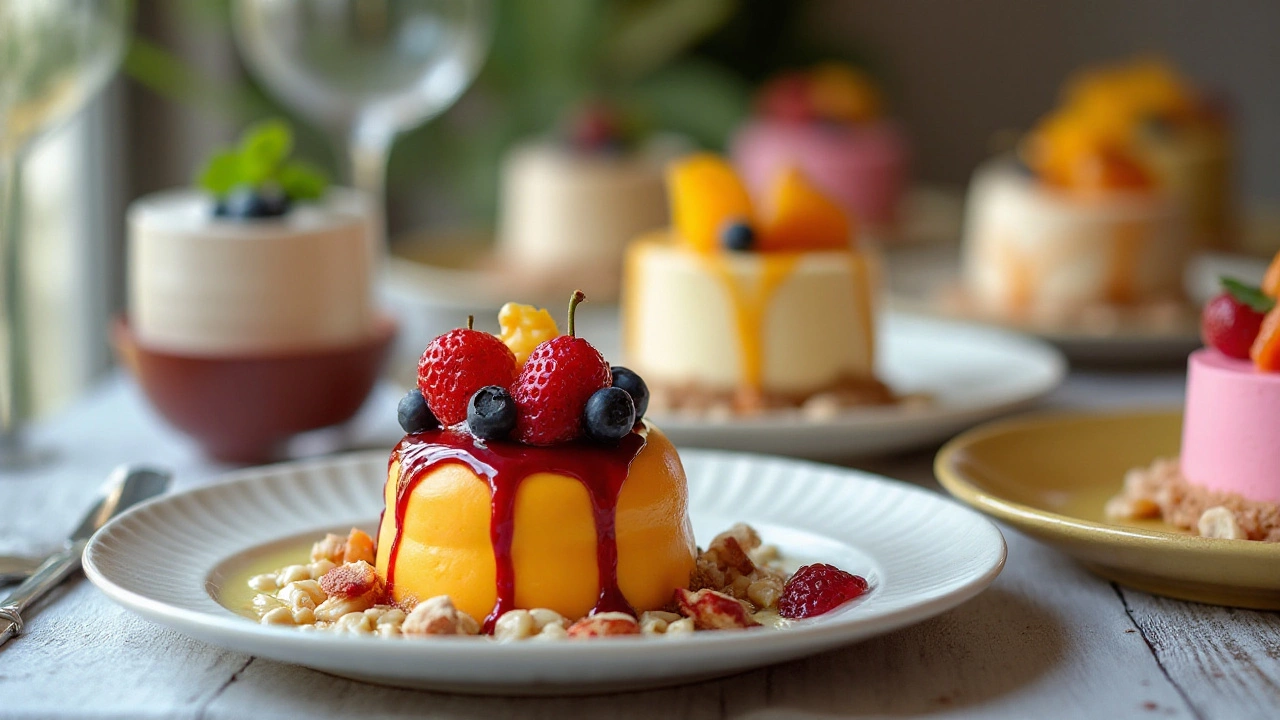
Tips for Successful Vegan Baking
Embarking on a journey into vegan baking can be both exciting and a tad daunting. The idea of crafting cakes, cookies, or pastries without traditional ingredients like eggs, butter, or milk might seem like a puzzle, but it opens a whole new world of culinary creativity. The key to acing vegan baking lies in understanding the role these ingredients play and finding plant-based substitutes that mimic their functionalities. Eggs, for example, often act as binders, and you can effortlessly substitute them with ingredients like flaxseed meal or chia seeds mixed with water. They create a gel-like consistency that helps glue your batter or dough together. Similarly, unsweetened applesauce or mashed bananas can add moisture and sweetness, doubling up as perfect egg replacements.
When it comes to replicating the creaminess of butter, options today are quite varied and effective. Vegan butter, made from plant oils, can be used interchangeably in recipes calling for traditional butter. You can also experiment with coconut oil or even nut butters like almond or cashew butter for unique flavors. Ensuring your culinary creations achieve the desired consistency and taste, however, might require some testing and tweaking. A soft approach would be to use slightly less liquid than your recipe suggests or to slightly adjust the baking time, as plant-based ingredients often behave differently under heat compared to their non-vegan counterparts.
Another fascinating tip is to pay attention to the kind of flour you are using. Many people don't realize that certain flours, specifically bleached ones, might contain traces of animal-based enzymes used during the processing. Opt for unbleached, organic flours to keep your baking fully plant-based. And if you feel adventurous, why not try using alternative flours like almond, oat, or chickpea flour to enhance the nutritional profile of your desserts? These flours not only contribute their distinctive flavors but also add fiber and proteins, making your treats healthier.
An often underestimated yet significant tip is to read your labels thoroughly. Many ingredients such as chocolate chips, sprinkles, or even some sugars may contain animal products or be processed using animal bone char. Ensuring these accompaniments are certified vegan aids in preserving the integrity of your plant-based approach. In an article from Ethical Consumer, one expert baker shares, "Understanding the origins of your ingredients and opting for fair trade or locally sourced products not only supports your values but enriches the taste and quality of your desserts."
Lastly, hone your skills by familiarizing yourself with trusted brands known for their vegan offerings. As the market for vegan products expands, numerous brands offer wonderful alternatives that can seamlessly fit into your dessert recipes. Investing in a few staple ingredients such as nutritional yeast, agar-agar for gelatin, and xanthan gum for thickening will enable you to expand your baking repertoire exponentially. With trials, wisdom, and a sprinkle of creativity, vegan baking not only becomes a possibility but a delightful and rewarding practice.
Delicious Vegan Dessert Ideas
Creating delightful, sinfully good vegan desserts is an art that brings both imagination and flavor to the table. With so many plant-based ingredients available, crafting desserts without butter has never been more exciting or accessible. Imagine sinking your teeth into a decadent vegan chocolate cake, each bite rich with deep cocoa flavor. This cake can be easily achieved using ingredients like coconut oil or applesauce to replace traditional butter. These alternatives not only replicate the texture butter provides but also add a subtle sweetness and moisture that enhance your treat.
One can't overlook the famous vegan chocolate avocado mousse. This dish artfully swaps traditional cream and eggs for the rich, creamy texture of ripe avocados. Blended with cocoa powder and a touch of maple syrup, the mousse offers a velvety smooth experience that dances across the palate. Another delectable choice is the beloved no-bake peanut butter bars. With ingredients such as crunchy natural peanut butter, shredded coconut, and plant-based chocolate chips, these bars ensure a guilt-free indulgence. As you enjoy these treats, you're partaking in a compassionate lifestyle that aligns with your values.
For those who adore fruit-forward desserts, vegan lemon bars provide the perfect tart counterpoint to your sweet cravings. The buttery base can be crafted from almond flour and coconut oil, creating a satisfying crunch. The zingy lemon filling, thickened with cornstarch and sweetened naturally, crowns these bars with sunny splendor. And who can resist the allure of a classic vegan butter cookie? By swapping out dairy butter for vegan margarine or even mashed banana, these cookies remain light and crispy.
A perennial favorite remains the classic apple crumble, where tender, spiced apples meet a golden crumbly topping. Featuring oats, nuts, and coconut oil as core ingredients, this dish is comforting and warmly nostalgic. Add a scoop of coconut milk ice cream, and you're in for a divine experience. Several bakers often remark,
“In vegan baking, every challenge is an invitation to taste success in the most gratifying ways,”highlighting the joy found in creating these delights.
For the more adventurous, consider a pistachio and rosewater vegan cake. Its vibrant colors and perfumed accents whisk you away to far-off lands with every bite. The inclusion of aquafaba—whipped liquid from chickpeas—serves both as a leavening agent and adds moisture, parallel to eggs. As you saunter through your culinary journeys in vegan desserts, know that each choice embodies a conscious, caring approach to nutrition and environment. Join the growing number of home bakers and professional chefs discovering the transformative power of creating delicious vegan desserts, leaving traditional constraints behind for a bountiful, imaginative future.


